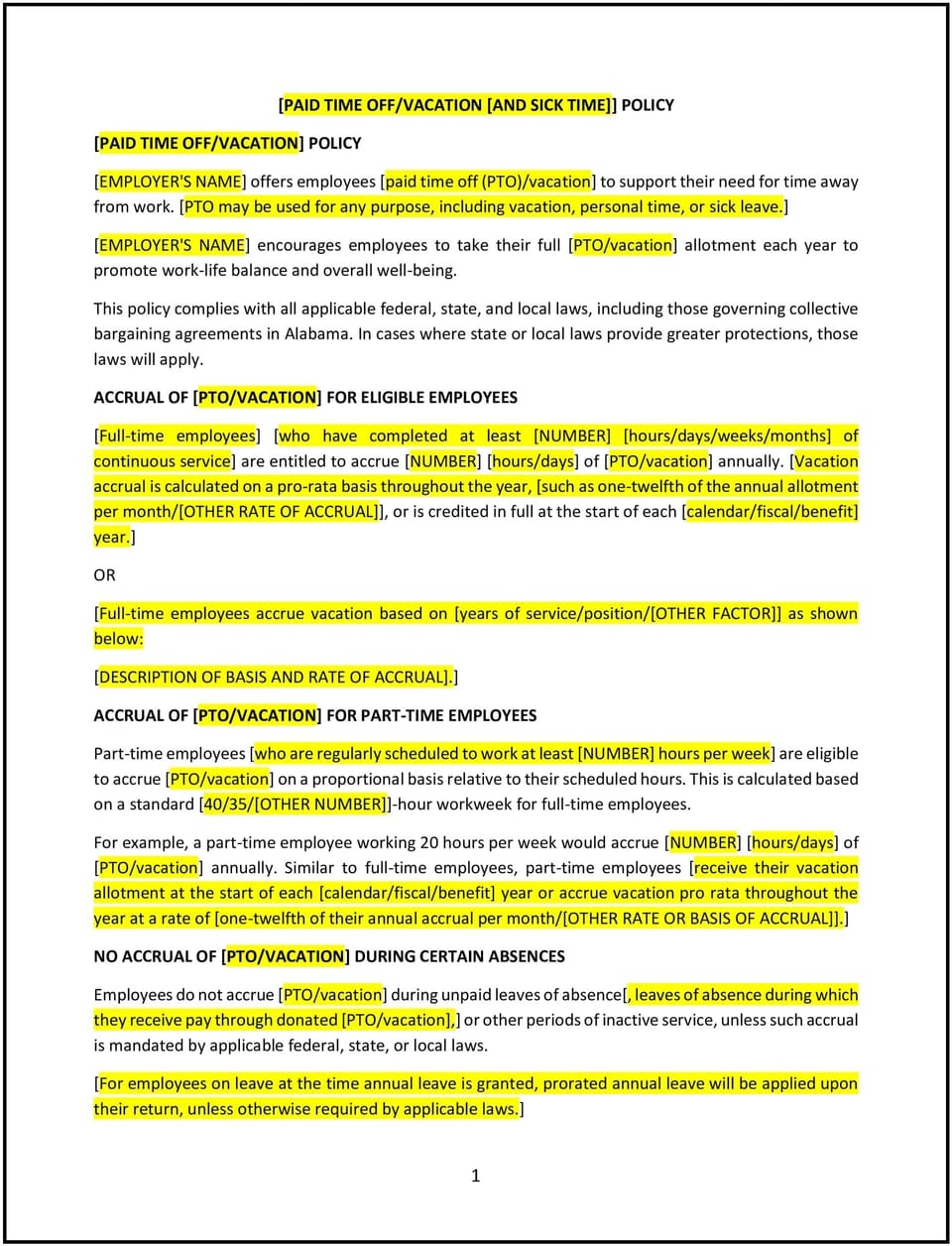Vacation policy (Alabama): Free template

Vacation policy (Alabama)
A vacation policy outlines the procedures and guidelines for employees to request, schedule, and take time off for personal rest and relaxation. For SMBs in Alabama, this policy ensures that vacation time is managed consistently, balancing employee well-being with the company’s operational needs.
This policy provides clarity on accrual rates, approval processes, and any restrictions, helping businesses create a fair and efficient system for managing vacation time.
How to use this vacation policy (Alabama)
- Define accrual rates: Specify how vacation time is earned, such as hourly accrual, monthly accrual, or as a lump sum at the start of the year.
- Outline scheduling procedures: Provide guidelines for submitting vacation requests, including required notice periods and approval processes.
- Address unused vacation: Clarify whether unused vacation time can be carried over, paid out, or forfeited at the end of the year or upon termination.
- Include blackout dates: Highlight periods when vacation requests may not be approved due to peak operational demands.
- Set expectations: Emphasize the importance of using vacation time to support work-life balance and avoid burnout.
Benefits of using a vacation policy (Alabama)
A well-structured vacation policy benefits both employees and the business. Here’s how it helps:
- Promotes employee well-being: Encourages rest and relaxation, boosting productivity and morale.
- Ensures fairness: Establishes clear and consistent rules for managing vacation time across the organization.
- Maintains productivity: Helps plan for staffing needs and minimizes disruptions during employee absences.
- Reduces disputes: Provides a transparent framework for handling vacation requests and conflicts.
- Supports compliance: Aligns with Alabama and federal labor laws regarding time off and final pay for unused vacation time.
Tips for implementing a vacation policy (Alabama)
- Communicate accrual details: Share clear information about how vacation time is earned and tracked.
- Use scheduling tools: Leverage software to streamline vacation requests and approvals, reducing administrative burdens.
- Monitor staffing levels: Ensure vacation approvals account for adequate coverage to maintain business operations.
- Provide reminders: Encourage employees to plan vacations early to avoid end-of-year backlogs or conflicts.
- Align with legal requirements: Regularly review state and federal laws to ensure the policy remains compliant.
Q: How should SMBs structure vacation accruals?
A: Vacation accruals can be based on hours worked, monthly accruals, or annual allotments. SMBs should choose a method that aligns with their operational needs and employee expectations.
Q: Can unused vacation time carry over to the next year?
A: Carryover policies depend on company guidelines. SMBs may allow unused vacation to roll over, impose a cap, or require employees to use time within a specific period.
Q: How much notice should employees provide for vacation requests?
A: Employees should give notice based on company policy, typically two weeks or more, allowing sufficient time to manage schedules and staffing.
Q: What happens to unused vacation time when an employee leaves the company?
A: Alabama does not require payout of unused vacation unless company policy specifies it. SMBs should document their policy clearly to avoid disputes.
Q: Are there restrictions on when employees can take vacation?
A: Yes, SMBs may set blackout dates during busy seasons or require staggered scheduling to ensure adequate staffing.
Q: How can SMBs encourage employees to take vacation?
A: Promote the importance of work-life balance and provide reminders about accrued time to ensure employees use their benefits effectively.
This article contains general legal information and does not contain legal advice. Cobrief is not a law firm or a substitute for an attorney or law firm. The law is complex and changes often. For legal advice, please ask a lawyer.


